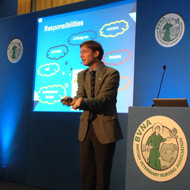
Veterinary nurses are legally mandated – and morally and ethically required – to implement animal welfare
As well as being animal ambassadors, veterinary nurses have special responsibilities when it comes to animal welfare, RSPCA chief vet, James Yeates, told delegates on the final day of the BVNA Congress in Telford.
Some of these responsibilities are 'inherent' and others are 'undertaken'. They can be divided into those that are 'owned' by individuals, while others are 'shared' – either being divided or delegated. There are also opportunities to help others to fulfil their responsibilities – pet owners, for instance.
We have a duty not to harm and we are responsible if we fail to do something to prevent an animal suffering harm, even if we are not directly in charge of that animal or in control of it. Vet nurses have an increased duty of care and by taking on theIr professional role are more aware of welfare issues and take on additional legal and moral responsibilities.
Different responsibilities come together in veterinary practice in the guise of the different skill sets and interactions of veterinary surgeons and vet nurses. Professional status, legal privilege and being employed as a veterinary nurse impart specific responsibilities, especially as this technically 'prevents' other people from fulfilling their duty of care. Nurses and vets 'promise' to assume this responsibility when animals are committed to their care.
Nurses have special skills in terms of animal welfare and will invariably be better at it than vets. There are times when it is justifiable for them to speak out and to challenge vets regarding procedures – "tactfully, humbly and constructively" – and clients in the discharge of their duty of care. So, for example, by not pointing out to an owner that their dog is obese, that client could argue that they were not aware of the problem, because "the nurse didn't say anything".
Many owners do not realise that there is no 'halfway house' in terms of their responsibilities towards their pets. Once they take on an animal, they are morally, ethically and legally responsible for its welfare.
James Yeates recently contributed a Comment article in the Autumn 2014 issue of Veterinary Practice Today



 The latest
The latest